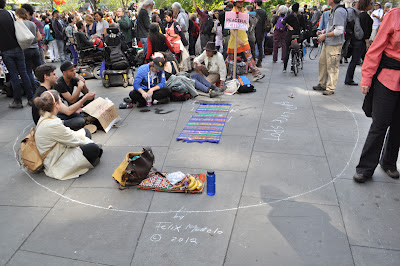 |
| Photo by Ali Giniger (instagram: @alinicoleg) |
The art studio that I work for showed up armored with aprons
that read “Artists for Immigration Reform.” I realized after the fact that
maybe only artists know that artists wear aprons. But they made good blank
canvases for slogans anyway. We thought we’d highlight the fact that we were
artists because it is much harder to get a visa to live in the US if you work
in a creative field. The elusive artist visa for this country requires the
blood signatures of the entire top echelon of the art world pyramid inscribed
on the skin of one of Damien Hirst’s sharks. (This is an exaggeration. But only
kind of.)
 |
| The paper-mache barrier fence was a nice touch when fist-pumped into the air. |
My apron had a strike through “HB56,” Alabama’s aggressive
anti-immigration law that requires police to determine someone’s legal status
if there is any suspicion that that person might be here illegally. It has
turned all official interactions into checkpoints and encouraged racial
profiling. The goal is “self-deportation,” a concept championed by its
originator and Mitt Romney’s unofficial advisor Kris Kobach. And it is
effective. People reach a threshold of harassment, exclusion, and fear for
their families and they leave. A similar, though not quite as militant, law is
in place in Arizona. Check out the podcasts for more:
 |
| Photo by Ali Giniger |
I had expected immigration reform to be the issue of the
day, but it was International Workers Day and the Occupy movement was out in
full force. Any group concerned with race and economic inequality came out to
play. And then there was the guy in the Captain America costume and the boy in
a loincloth dragging a cross around who gave you the impression that this was status quo. It just so happened that today they woke up and
got dressed and instead of being ostracized and run off by the police again
they were embraced by the pit stained arms of thousands.
One group of activists took me by surprise. It was the first
time I’d seen artists marching for… artists! Demanding more support from the
State and raising awareness that being creative is productive. Signs read “ART
IS WORK,” “PAY YOUR INTERNS,” “ART STRIKE,” “ANOTHER ART WORLD IS POSSIBLE.”
This shocked me at first. Don’t these people know that they signed up for
something inherently useless? Didn’t they get the memo that our country’s
puritan roots would never support such frivolous antics? But of course, art has
always taken progressive stands and demanded change. It just usually speaks
(for good reason) through the medium itself. Either way, we agreed with their
sentiments and joined forces with this group, marching alongside them from
Union Square deep into the bowels of the Financial District.
Highlights of the day included sighting a monk with a sign
that read “Occupy Time” hanging from his back and “Occupy Space” hanging from
his front. I also loved watching a women’s group – protesting the
neo-conservative, repressive dialogue about women’s health and sexual freedom
that has recently been spouting from Republican presidential candidates – melt
into a chorus of oohs and aahs at the appearance of a baby in a stroller.
Back before the parade began, my street artist friend Felix
drew a chalk circle by the Gandhi statue. He tagged it with “good luck” in one
section and “bad luck” in another. The “good luck” side was immediately
occupied by the most flowery of the ribbon-wearing, barefoot hippies. Signs of
“PEACEFUL PROTEST” and “LOVE” sprung up in this place as if it was a goodwill
garden. Soon the arbitrary circle was ringed with people and a shrine of
peaceful objects began accumulating in its center. People began to meditate and
soon the circle was too thick with bodies to see the “bad luck” anymore. These
harbingers of peace might have been reluctant to plop themselves down on just
any plot of dirty, crowded pavement. But inside the chalk circle they were
safe, sanctioned, choreographed -- not by society’s red tape -- but by an
outsider, by old magic and old pagan ties. It was a reminder that the central
mountain is everywhere. And an illustration of how a few simple lines can start
to mean something.










